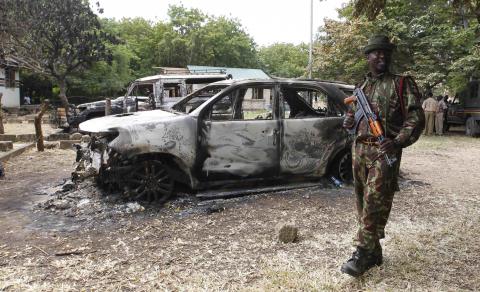Advertisement
Kenya detains two over attacks which stoked tensions
MOMBASA Kenya (Reuters) - Police said they detained two men on Wednesday linked to attacks along Kenya's coast that killed amount 65 people and fuelled a political row over security.
Islamist militants from neighbouring Somalia claimed responsibility for the attacks and execution-style killings - but Kenya's President Uhuru Kenyatta has dismissed their account, saying the assaults were the work of domestic rivals.
Gunmen raided the town of Mpeketoni overnight Sunday to Monday, killing 49 people, some of them gathered to watch World Cup soccer matches on television. They then attacked a nearby village 24 hours later.
Survivors said they were held at gunpoint and told to prove they were Muslims.
A senior officer said on Wednesday the police had arrested two men linked to minibuses used in the attacks. One man was the owner of one of the vehicles and the other was a driver known to have used one of the buses.
"We are conducting very serious and comprehensive investigations," John Miiri, appointed police chief in the area after his predecessor was sacked after the attacks over security failings, told Reuters. "The two are being interrogated."
The new attacks have fuelled public criticism of the government for failing to do more to improve national security.
Kenya has blamed al Shabaab for a spate of gun and bomb attacks in recent months and holds it responsible for a raid on Nairobi's Westgate shopping mall in September last year in which 67 people were killed.
But Kenyatta shifted blame to domestic rivals on Tuesday, accusing them of "hate-mongering" and trying to stoke ethnic tensions.
Kenyatta, an ethnic Kikuyu, did not offer any names, but his comments were widely seen as referring to his rival in last year's presidential race, Raila Odinga, a Luo, who recently returned from abroad and has held a series of rallies that have charged the political atmosphere.
Odinga called Kenyatta's statements blaming local politicians and leaders as "unfortunate and unjustified" and said it would compromise the investigations.
Al Shabaab has said its operations are intended to punish Kenya for sending troops to Somalia to confront its Islamist fighters. Kenya has previously said it would keep its troops in Somalia.



















Add new comment